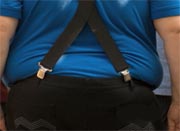- Double Mastectomy May Offer No Survival Benefit to Women With Breast Cancer
- Toxic Lead Found in Cinnamon Product, FDA Says
- Certain Abbott Blood Sugar Monitors May Give Incorrect Readings
- Athletes Can Expect High Ozone, Pollen Counts for Paris Olympics
- Fake Oxycontin Pills Widespread and Potentially Deadly: Report
- Shingles Vaccine Could Lower Dementia Risk
- Your Odds for Accidental Gun Death Rise Greatly in Certain States
- Kids From Poorer Families Less Likely to Survive Cancer
- Tough Workouts Won’t Trigger Cardiac Arrest in Folks With Long QT Syndrome
- At-Home Colon Cancer Test Can Save Lives
Weight Loss Can Combat Irregular Heart Beat, Study Says


Overweight or obese people can cut their risk of trouble with a potentially fatal irregular heart beat if they lose a lot of weight, a new study has found.
Losing a bit more than 30 pounds, on average, caused people to have fewer and less severe bouts of heart palpitations related to atrial fibrillation.
The findings were presented Sunday at the American Heart Association annual meeting in Dallas, and published simultaneously in the Journal of the American Medical Association.
Atrial fibrillation is a disorder of the electrical impulses that coordinate the beating of the heart. Rapid and disorganized electrical signals cause the heart’s two upper chambers — the atria — to contract in a fast and irregular way. The condition can increase a person’s risk of stroke and contribute to heart problems.
The new study found that people on a strict weight-management plan experienced a five-fold decrease in the severity of their atrial fibrillation symptoms, compared with those who only received nutrition and fitness advice.
The dieters also had a 4.5-times better overall decrease in symptoms and a two-and-a-half-times greater decline in episodes of atrial fibrillation, the study authors said. Symptoms can include heart palpitations, shortness of breath, dizziness, fatigue, fainting and chest pain.
“Weight loss will help most people who are overweight” with their atrial fibrillation, said study co-author Dr. Prashanthan Sanders, director of the Centre for Heart Rhythm Disorders at the University of Adelaide in Australia. “Extra weight, through so many ways, has a significant impact on the atria [upper chambers of the heart].”
For example, obesity increases inflammation and can contribute to the thickening of the heart’s wall, the study authors said.
The study authors called atrial fibrillation “the epidemic of the new millennium,” projecting that by 2050 between 12 million and 15 million Americans will be affected by the heart disorder. The reason: the growing obesity epidemic.
The 19-month study involved 150 people with a body-mass index (BMI) greater than 27. In general, a person with a BMI — a ratio of weight to height — greater than 25 is considered overweight. Someone with a BMI greater than 30 is considered obese, according to the U.S. Centers for Disease Control and Prevention.
Obesity is thought to be a major contributor to atrial fibrillation, Sanders said. “Several epidemiological studies have suggested this,” he said. “There are several reasons why — sleep apnea, hypertension [high blood pressure] and metabolic syndrome.”
According to background information provided in the study, people experience a 4 percent to 5 percent increased risk of atrial fibrillation every time their BMI increases by 1 point.
For the new study, half of the participants underwent a weight-management plan that for the first eight weeks required a very low-calorie diet of between 800 and 1,200 calories per day. They received a weight-loss shake for two of their daily meals, and a third meal with high levels of proteins.
These people also had to follow a written exercise plan that prescribed low-intensity exercise like walking or cycling three times a week, starting at 20 minutes per session and gradually increasing to up to 45 minutes.
The other study participants were just provided advice on nutrition and exercise.
The people in the weight management plan ended up losing 33 pounds on average, compared with an average 12.5 pounds lost by the advice group.
Along with the weight, both groups also shed symptoms of atrial fibrillation. But the weight-management group experienced significantly greater reductions in problems with atrial fibrillation.
American Heart Association Past President Dr. Gordon Tomaselli said it makes sense that losing weight would help people who are experiencing an irregular heart beat.
“Anything that increases cardiac demand can increase the risk of atrial fibrillation,” he said.
Tomaselli, chief of cardiology at Johns Hopkins University School of Medicine, added that a person doesn’t have to go to the extremes undertaken by the weight-management group to get some benefit.
“Time and time again, any weight loss has been shown to help people,” he said. “Exercise is good for you. If you exercise more tomorrow than you did today, you’re doing the right thing.”
More information
For more on atrial fibrillation, visit the U.S. National Heart, Lung, and Blood Institute.
Source: HealthDay
Copyright © 2024 HealthDay. All rights reserved.










